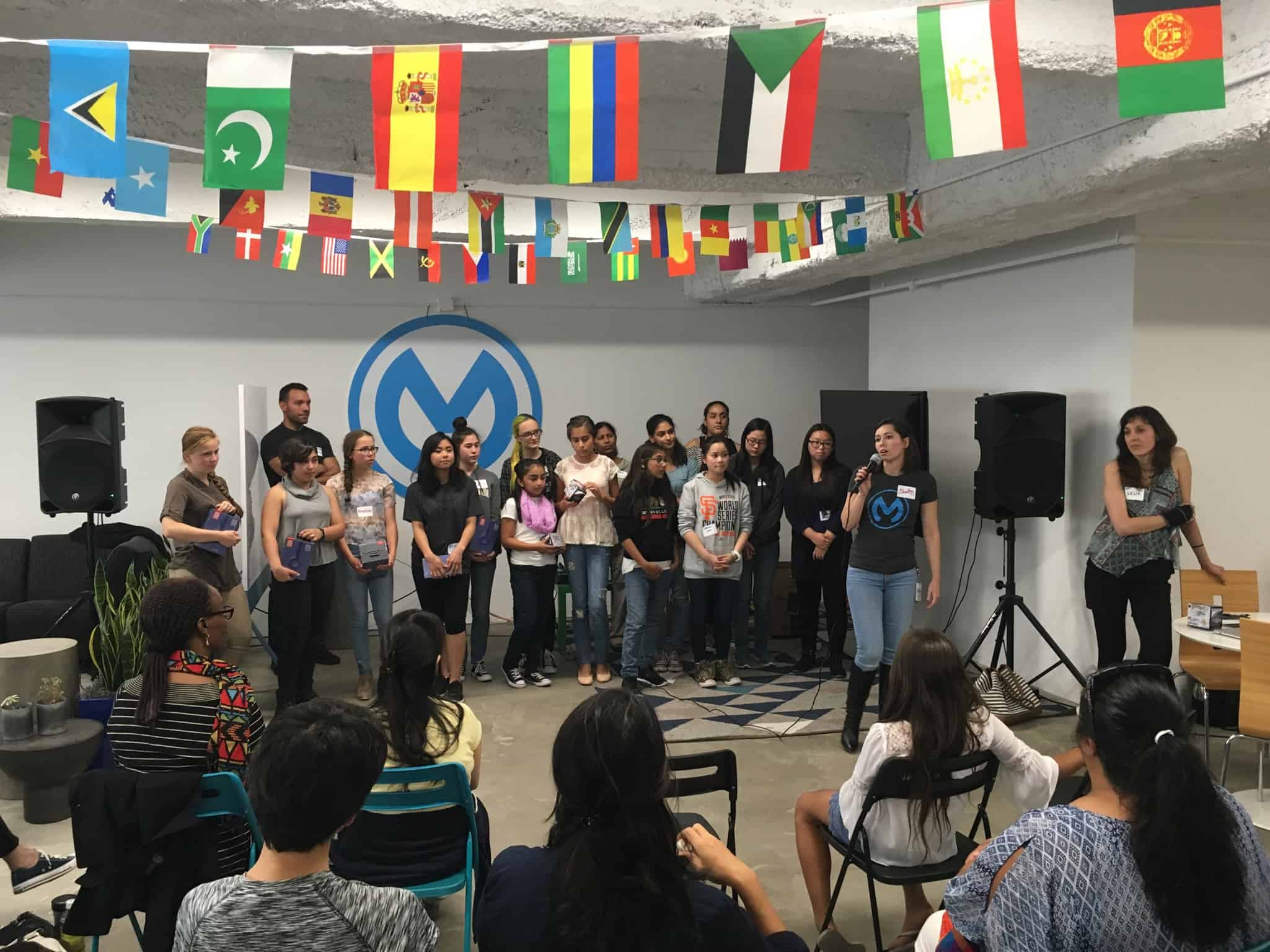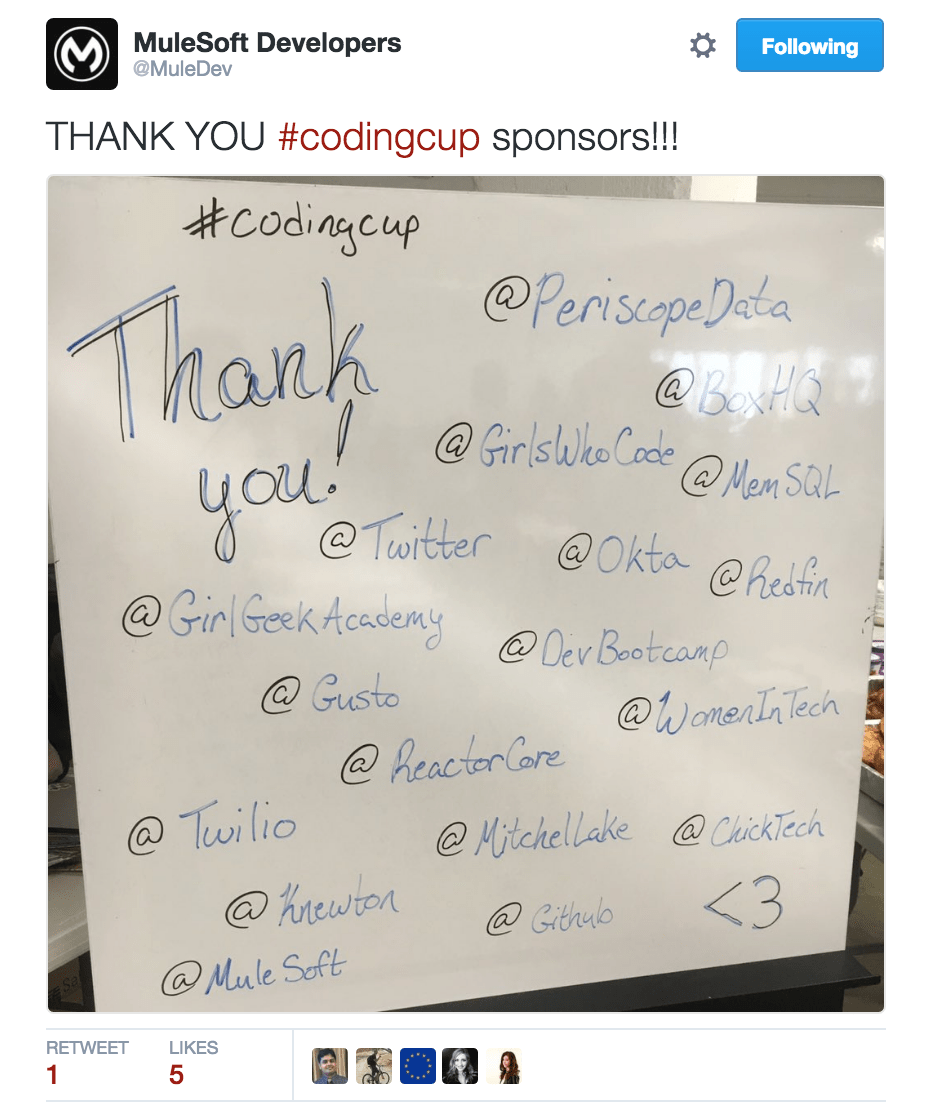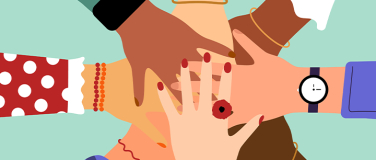Many young women love engineering and technology but by the time they reach college and the job market, far too many of them have been discouraged to follow their passion and drop out of the field. The National Girls Collaborative Project reports that while female and male students enroll in advanced math and science courses at comparable rates, women ultimately receive far fewer degrees in computer science and engineering (17.9% and 19.3% of degrees, respectively).
Shelby Wingo, Recruiting Coordinator at MuleSoft, saw this gap between girls’ formative years and then their time in college and careers as unacceptable, and she wanted the tech community to do something about it. “We had just formed a Women at MuleSoft group at our annual company-wide Meetup, so I had the topic of women in tech on the brain,” Shelby explained. “I was frustrated that the conversation in the community was mostly talk and not enough action. Furthermore, the conversation often points to a pipeline issue, but it really starts at the beginning, preparing girls for a future in a world full of technology.”
Along with a few Muleys, Shelby created a task force to launch the first-ever Coding Cup, a free hackathon for middle- and high school-aged girls with the purpose of building a community of young engineers and giving them the tools to continue on a path in computer science and engineering, all in a fun-filled, information- (and swag)-packed day. We held the event just a few weeks ago, and the impact has been huge.
Connecting the tech community
“We thought a hackathon would be a creative way for young girls to learn something new,” said Shelby. “I also knew that this is a topic that’s important to the greater tech community, so I wanted to get as many people from the outside involved as well.”
The Coding Cup team engaged tech companies across San Francisco, and got overwhelming support and enthusiasm from companies like Twitter, Twilio, Okta, Periscope Data, Hack Reactor, Girls Who Code, and more. These companies provided not only monetary sponsorship for things like breakfast, lunch, and prizes, but also awesome swag for the girls to bring home, notebooks for the day, and mentors who volunteered their time to teach the girls basic coding skills and guide them to building a unique and inspiring project.
Liz Hubertz, Computer Scientist with Adobe Typekit and one of the Coding Cup mentors, shared the story of a high schooler on her team whose only prior experience was at a short summer program: “She was the only girl in her class, and she said none of the boys wanted to be friends with her. As a result, she lost interest early on,” Liz explained. “At this age, it’s easy to convince girls that engineering is awesome if it’s presented well. What’s harder is keeping them engaged, which includes fostering an environment where they feel accepted for who they are, can make friends, and are encouraged to express their creativity.”
The event: “Connect your world”
Building off of the MuleSoft mission to connect the world’s apps, data, and devices, we devised a hackathon project that invited the girls to connect their world, taking the APIs from their favorite apps and connecting them together to create something new. Girls formed teams of up to five based on experience level, and each team had two mentors to make sure the girls were not only learning, but successful in building their projects.
“The girls on my team didn’t come in with coding experience, but they still left with a fantastic app built out from wireframes to business model,” said Liz. “What I think was key about Coding Cup in making this possible was its focus on learning and collaboration, as opposed to strict competition. This really opened the girls up to creative experimentation and connecting with other girls at the event.”
The aspiring engineers built their projects using App Inventor, “an innovative beginner’s introduction to programming and app creation that transforms the complex language of text-based coding into visual, drag-and-drop building blocks.” One of the highlights of the day was having Ellen Spertus, Professor of Computer Science at Mills College and the inventor of App Inventor, provide an inspiring keynote presentation. Both Ellen and Maren Lau, CMO at IMS Internet Media Services, gave talks that highlighted the great work they’ve done in the field and the contributions of women in technology over the past century.
“The world is our oyster”
Liz’s team of novice coders built Home World, a social network that leverages Instagram with different feeds for your interests, like art, writing, or philosophy, so that you can connect with people who share your interests. All the projects were both impressive for the skill level and amount of time the girls had, and equally inspiring, but at the end of the day, we chose four winners who received prizes like mini drones, Beats by Dre headphones, and Amazon gift cards (thanks to our sponsors!)

The Winners
Overall winner: Mentor Meet — This app matches mentors with people interested in learning at meetups and hackathons. It integrates with the Facebook and Google Maps APIs.
Most creative: Solteria — A tool for women to help them stay safe at night walking home. This innovative app provides scheduled check-ins that alert your emergency contact if you do not check in that you’re home safe; a “fake call from mom” that lets you push a button to receive a fake call to get out of a bad situation; and a whistle alert, which uses a panic button that raises a very loud whistle. This app integrates with Android APIs to deliver these different functionalities.
Intermediate award: SpotiLingo — A fusion app merging the features of Spotify for music and DuoLingo for language learning, it allows you to choose the language you want to learn and then suggests playlists based on that language.
Beginners’ award: Top Ten Music Now — Display the most current top music hits from different genres in an app that integrates the Spotify API, it also filters top 10 songs by country. At the end of this project, the girls on the team said, “It was a rough start, but after a while, we started to get the hang of it. We learned that as a team, we can accomplish anything we want. The world is our oyster.”
Bringing it home
One of the most important components to Coding Cup wasn’t even the event itself, but giving the girls a community of support and tools to continue to follow their interests in computer science and engineering. Girl Geek Academy, an organization committed to raising the profile of women in technology, donated a fully paid membership to each Coding Cup attendee. The membership lets the girls register their projects in the community and includes first access to events, personal branding, and more. Additionally, Box donated two paid memberships to Code School, which offers hands-on programming courses.
These tools are already working: One participant took it upon herself to bring the idea of girls coding together to her high school. She wrote to us, “I had such a great time at Coding Cup, I thought, why don’t I make a Girls Who Code club at my school? This event inspired me to make a club to give other girls at my school the opportunity to go to events just like Coding Cup! To my astonishment, more than 30 girls signed up and are more than excited to learn how to program.”
“It’s really amazing the amount of people who were energized by this initiative and felt it was something that was worth their time. I’m really grateful for the people at MuleSoft and the larger tech community for giving this event a chance,” said Shelby. “I’m so excited about the momentum that Coding Cup has had. It’s already paying off.”
Check out more snapshots of Coding Cup, and feel free to drop me a note if you want to learn more about MuleSoft or the event!









